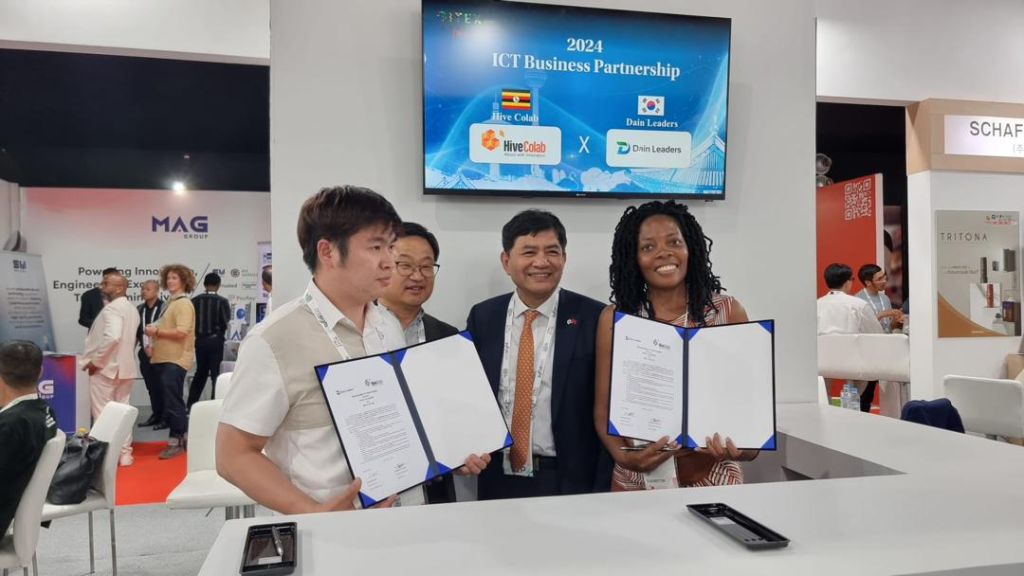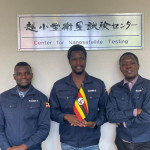Ugandan Startups Forge Transformative Partnerships with Asian Tech Giants at Gitex Africa 2024

Three innovative startups from Uganda have signed groundbreaking partnerships with leading Asian tech companies at Gitex Africa 2024 in Morocco Marrakech. These agreements signify a significant advancement for Uganda’s tech ecosystem and highlight Africa’s growing influence in the global tech arena

3 Ugandan Startups Sign Partnerships with Asian Tech Giants at Gitex Africa 2024
In a remarkable display of Uganda’s burgeoning tech prowess, three pioneering startups from the East African nation have solidified groundbreaking partnerships with prominent Asian tech giants.
The agreements were inked during the prestigious Gitex Africa 2024 event in Morocco Marrakech, a premier platform that fosters collaboration and innovation within the continent’s tech ecosystem.
These MoUs not only signify a significant stride forward for Ugandan startups but also underscore the growing recognition of Africa’s vibrant tech landscape on the global stage.
Hive Colab marked a historic moment as the first Ugandan startup to formalize an MoU with the esteemed Korean company, Dain Leaders, during Gitex Africa 2024. Recognizing the pivotal role of fostering Uganda-Korea relations and promoting collaboration to bolster support for startups in Uganda, the parties involved are committed to advancing mutual benefit and the development of their respective companies. Hence, they have come together to establish this Memorandum of Understanding (hereinafter referred to as “MOU”).
The Parties shall promote the following exchange activities, based on their respective Start-Ups and educational needs in various fields of ICT, healthcare, Education, and Training: a) Strategic partnership; b) Joint research and training;
c) Exchange of ICT training materials, publications, and information.
The second was Ntakye Holdings which signed an MoU with Jubix also from South Korea and the two are to work together on solar-integrated technology.
Canine Safaris also signed a partnership with a Korean AI company called Flitto and they are to use AI to preserve culture by converting as many as local dialects.

The second was Ntakye Holdings which signed an MoU with Jubix also from South Korea and the two are to work together on solar-integrated technology.
Uganda’s digital sector, which has been drawing attention for its creative solutions and spirit of entrepreneurship, is dynamically evolving, as evidenced by the participation of Ugandan businesses in Gitex Africa 2024.
These firms have become change agents, propelling innovations in a variety of fields, from finance to healthcare and beyond, against the backdrop of a fast-digitising economy and a growing youth population ready to embrace technology.
Their attendance at Gitex Africa is proof of the revolutionary potential ingrained in Africa’s tech scene, drawing the attention of global players looking for joint ventures and investment opportunities.
This is the second time Uganda has represented GITEX, last year only five startups managed to participate, but this year 15 participated, meanwhile, so the first and second groups have managed to showcase their tech innovations at the global platform courtesy of The Youth Startup Academy Uganda (YSAU), an initiative focused on promoting youth-led entrepreneurship and economic development and Hive Colab which has played a pivotal role in nurturing YSAU startups, shaping the next generation of tech entrepreneurs.
These Ugandan entrepreneurs’ alliances with Asian tech behemoths mark a critical turning point in the process of encouraging cross-continental cooperation and utilising synergies to address urgent global issues.
Through their partnership, these organizations hope to leverage the combined knowledge and assets at their disposal to jointly develop creative solutions that cut across borders and address the changing demands of various markets.
These partnerships have the potential to promote knowledge sharing, talent development, and socioeconomic empowerment in addition to the obvious advantages of technology transfer and market access. As a result, they may support the larger goals of sustainable development and equitable growth.







